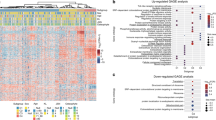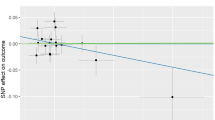Abstract
A genetic association of knee osteoarthritis (OA) and a C/T transition single nucleotide polymorphism (SNP) (rs912428) located in intron 1 of the LRCH1 gene has recently been reported in European Caucasians; however, the results are inconsistent. Our objective was to evaluate the association in different knee OA populations. Three case-control association studies were conducted in Han Chinese, Japanese, and Greek Caucasian populations. The LRCH1 SNP was genotyped in patients who had primary symptomatic knee OA with radiographic confirmation and in matched controls, and the association was examined. We performed a meta-analysis for the studies together with results of two previous papers using the DerSimonian–Laird procedure and calculated the power of the pooled studies by the software R. A total of 1,145 OA patients and 1,266 controls were genotyped. No significant difference was detected in genotype or allele frequencies between knee OA and control groups in the three populations (all P > 0.05). Association was not observed even after stratification by gender and Kellgren/Lawrence (K/L) scores. Meta-analysis also supported the lack of association between LRCH1 and knee OA. The strong heterogeneity between original and replication studies was detected in Caucasian populations. However, a tendency for the increase of TT genotype was observed in the European populations (OR = 1.46, P = 0.06). The powers for European and Asian replication studies were less than 0.8. Our results suggest that there is no association between LRCH1 and knee OA. However, lack of association should be concluded by further replication studies.
Similar content being viewed by others

Log in or create a free account to read this content
Gain free access to this article, as well as selected content from this journal and more on nature.com
or
References
Bertram L, McQueen MB, Mullin K, Blacker D, Tanzi1 RE (2007) Systematic meta-analyses of Alzheimer disease genetic association studies: the AlzGene database. Nat Genet 39(1):17–23
Holderbaum D, Haqqi TM, Moskowitz RW (1999) Genetics and osteoarthritis exposing the iceberg. Arthritis Rheum 42(3):397–405
DerSimonian R, Laird N (1986) Meta-analysis in clinical trials. Control Clin Trials 7:177–188
Du H, Chen SL, Bao CD, Wang XD, Lu Y, Gu YY, Xu JR, Chai WM, Chen J, Nakamura H, Nishioka K (2005) Prevalence and risk factors of knee osteoarthritis in Huang-Pu District, Shanghai, China. Rheumatol Int 25(8):585–590
Ikegawa S, Kawamura S, Takahashi A, Nakamura T, Kamatani N (2006) Replication of association of the D-repeat polymorphism in asporin with osteoarthritis. Arthritis Res Ther 8(4):403
Ikegawa S, Ikeda T, Mabuchi A (2003) Genetic analysis of osteoarthritis: toward identification of its susceptibility genes. J Orthop Sci 8(5):737–739
Jiang Q, Shi D, Yi L, Ikegawa S, Wang Y, Nakamura T, Qiao D, Liu C, Dai J (2006) Replication of the association of the aspartic acid repeat polymorphism in the asporin gene with knee-osteoarthritis susceptibility in Han Chinese. J Hum Genet 51(12):1068–1072
Jin SY, Hong SJ, Yang HI, Park SD, Yoo MC, Lee HJ, Hong MS, Park HJ, Yoon SH, Kim BS, Yim SV, Park HK, Chung JH (2004) Estrogen receptor-alpha gene haplotype is associated with primary knee osteoarthritis in Korean population. Arthritis Res Ther 6(5):R415–R421
Kellgren JH, Lawrence JS (1963) Radiological assessment of osteoarthrosis. Ann Rheum Dis 22:237–255
Kizawa H, Kou I, Iida A, Sudo A, Miyamoto Y, Fukuda A, Mabuchi A, Kotani A, Kawakami A, Yamamoto S, Uchida A, Nakamura K, Notoya K, Nakamura Y, Ikegawa S (2005) An aspartic acid repeat polymorphism in asporin inhibits chondrogenesis and increases susceptibility to osteoarthritis. Nat Genet 37(2):138–144
Miyamoto Y, Mabuchi A, Shi D, Kubo T, Takatori Y, Saito S, Fujioka M, Sudo A, Uchida A, Yamamoto S, Ozaki K, Takigawa M, Tanaka T, Nakamura Y, Jiang Q, Ikegawa S (2007) A functional polymorphism in the 5′ UTR of GDF5 is associated with susceptibility to osteoarthritis. Nat Genet 39(4):529–533
Nuki G (1999) Osteoarthritis: a problem of joint failure. Z Rheumatol 58:142–147
Snelling S, Sinsheimer JS, Carr A, Loughlin J (2007) Genetic association analysis of LRCH1 as an osteoarthritis susceptibility locus. Rheumatology (Oxford) 46(2):250–252
Spector TD, Reneland RH, Mah S, Valdes AM, Hart DJ, Kammerer S, Langdown M, Hoyal CR, Atienza J, Doherty M, Rahman P, Nelson MR, Braun A (2006) Association between a variation in LRCH1 and knee osteoarthritis: a genome-wide single-nucleotide polymorphism association study using DNA pooling. Arthritis Rheum 54(2):524–532
Acknowledgments
This work was supported by the National Nature Science Foundation of China (3057874) (to DS and QJ), the Programme of Technology Development of Nanjing (200603001) (to DS and QJ), and the Hellenic Association of Orthopaedic Surgery and Trauma (to AT and KNM).
Author information
Authors and Affiliations
Corresponding authors
Additional information
Qing Jiang and Dongquan Shi contributed equally to this work.
Rights and permissions
About this article
Cite this article
Jiang, Q., Shi, D., Nakajima, M. et al. Lack of association of single nucleotide polymorphism in LRCH1 with knee osteoarthritis susceptibility. J Hum Genet 53, 42 (2008). https://doi.org/10.1007/s10038-007-0216-4
Received:
Accepted:
Published:
DOI: https://doi.org/10.1007/s10038-007-0216-4
Keywords
This article is cited by
-
Collaborative cross mice in a genetic association study reveal new candidate genes for bone microarchitecture
BMC Genomics (2015)
-
Genetic epidemiology of hip and knee osteoarthritis
Nature Reviews Rheumatology (2011)


